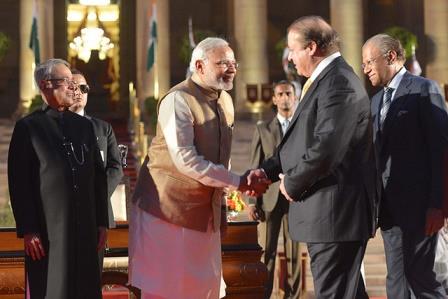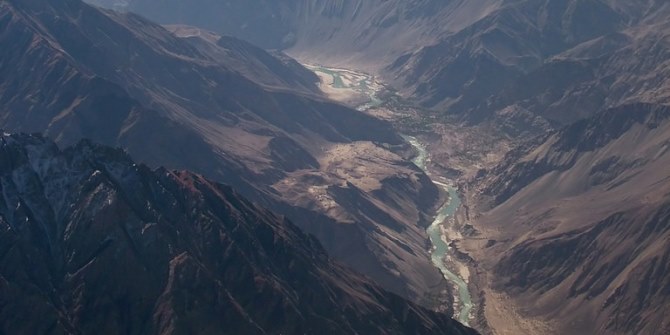 Sharif’s presence at Modi’s inauguration was widely perceived by the media as a positive sign for India-Pakistan relations. But Matthew J. Nelson argues that although Sharif might be well-disposed to India’s new administration, increased trade and better relations will rely on India’s support for Sharif’s efforts to persuade the Pakistan Army of the benefits.
Sharif’s presence at Modi’s inauguration was widely perceived by the media as a positive sign for India-Pakistan relations. But Matthew J. Nelson argues that although Sharif might be well-disposed to India’s new administration, increased trade and better relations will rely on India’s support for Sharif’s efforts to persuade the Pakistan Army of the benefits.
This post forms part of a new series on the India At LSE blog, India’s Foreign Relations Under Modi. Click here to see more posts.
Narendra Modi and Nawaz Sharif recognise that expanding economic opportunities via increased trade could pay enormous political dividends—for their countries and their parties. The economic and political landscape of South Asia is shifting rapidly. During the past 20-25 years, labour migration, urbanization, and an entrepreneurial spirit have fuelled a rapid expansion of opportunity (and, some would say, insecurity) across the informal sector. Today, tech-savvy young people rail against old-school forms of corruption tying South Asia’s self-serving bureaucrats to its notoriously venal politicians.
Prime Minister Modi has this young tiger by the tail, at least for the moment, stitching India’s lower castes, business leaders, and urban youth together with his traditional Hindu-middle-class supporters. But, in Pakistan, Prime Minister Nawaz Sharif is struggling. He continues to enjoy the support of most Punjabis—in the Punjab itself as well as in Balochistan and Karachi—but beyond this his outlook is uncertain. In the Punjab, urban youth are toying with the idea of shifting their support to Imran Khan; Karachi and Balochistan remain violently split along ethnic lines; and, across Pakistan, the PML-N’s traditional ties to right-of-centre voters are becoming tangled up with militants bent on tearing the country apart one sect at a time. Modi and Sharif are business-oriented politicians. Each sees the value of increased trade. Each believes that the benefits of trade ‘trickle down’. Each understands that economic optimism (however precarious) equals votes. They want to work together. But can they?

Modi and the foreign policy community in Delhi have much in common with Sharif. Both know that the road from Mumbai to Karachi does not pass through Delhi or Islamabad. Instead, it passes through Rawalpindi. In fact, en route to the General Headquarters (GHQ) of the Pakistan Army in Rawalpindi, it almost certainly passes through small towns like Muridke, the headquarters of Jama’at-ud-Dawa and its militant offshoot, Lashkar-e-Tayyaba (implicated in numerous terrorist attacks, including the 2008 attack in Mumbai that killed more than 280 people). Indeed, the challenge for elected politicians like Modi and Sharif does not lie in improving relations between politicians like themselves. The challenge lies in developing proposals that advance the possibility of cross-border trade while, at the same time, soothing the nerves of those in Rawalpindi.
The generals sitting in Rawalpindi are a twitchy group. They are suspicious of Sharif and his civilian National Security Policy (seeking to engage the military in a more ‘collaborative’ approach to strategic and foreign affairs). They are distrustful of New Delhi (with a particular anxiety about Indian ‘encirclement’ via Delhi’s involvement in Afghanistan). And of course they are concerned about the penetration of Pakistan itself by an avalanche of Indian capital (with particular concerns about the superiority of Indian manufacturing and IT). Their concerns regarding Indian capital are not tied to any specific military calculation; instead they are tied to the economic calculations of the Army—economic calculations within which the Army benefits enormously from an environment sustained by American military assistance and global financial institutions worried about the collapse of a nuclear-armed state bristling with jihadi militants. For the generals in Rawalpindi, the benefits of a shift ‘from aid to trade’ are not always intrinsically obvious. On the contrary,, Sharif and Modi are often seen as a deeply threatening pair.
When Modi invited Sharif to attend his post-election inauguration in Delhi, much was made of Modi’s effort to shore up closer ties with Pakistan. A closer look, however, suggests that Indian officials did not attach much importance to Nawaz Sharif. On the contrary, Sharif was invited as something of an empty vessel—a vessel for carrying India’s core concerns back to Pakistan’s corps commanders. Of course officials in Delhi understand that Sharif is largely powerless to rein in militant proxies like Lashkar-e-Tayyaba. But, even so, there is a general sense that Prime Minister Sharif’s political appreciation for matters of the pocketbook might prompt him to pressure the Pakistan Army on its proxies. In fact, with almost no independent access to Pakistan’s GHQ—not to mention an allergic reaction to working through officials in Beijing or Washington (where the possibility of some influence might be greater)—foreign policy strategists in Delhi have sought to recalibrate their relationship with Rawalpindi via civilians like Nawaz Sharif.
When Sharif pushes Pakistan’s generals to consider Non-Discriminatory Market Access (NDMA) with India, one could be forgiven for asking whether he is acting on his own impulse or that of his civilian counterparts in Delhi. The answer may be ‘both’. As Sharif begins to lean more heavily on the military—after all, General Pervez Musharraf is still facing trial for treason in a special civilian court—some fear that the Army may opt to intervene in matters of governance more directly. But Sharif is sanguine. In fact, courting his civilian counterparts in Delhi, he could almost be seen as a champion of the democratic peace!
One often hears that Pakistan’s foreign policy community remains completely set apart from the pressures of electoral accountability. But, again, this view is somewhat misleading. Pakistan is not yet a democracy when it comes to matters of foreign policy, but Nawaz Sharif understands that the Army is not detached from an appreciation for the importance of public opinion. His task simply lies in encouraging the Army to see increased trade with India as ‘win-win’. Few will be surprised if, in this push to transform Pakistani guns into butter, some of the earliest ‘wins’ accrue to dairy farms owned by the soldiers based in Rawalpindi.
In so many ways, the future of India-Pakistan relations lies in the subtle effectiveness of Narendra Modi’s support for Pakistan via Nawaz Sharif. Specifically, it lies in Sharif’s ability to satisfy the demands of two different constituencies simultaneously: voters and soldiers. Sharif’s primary loyalty lies, as it should, with his voters. But his ties with Rawalpindi come with enormous geostrategic implications. The struggle to expand cross-border trade between India and Pakistan is, in the end, a domestic struggle shaped by civil-military relations in Pakistan. These relations have as much to do with the livelihoods (and the loyalties) of the Pakistani public as they do with the interests of soldiers based in Rawalpindi. It is surprising that, so far, Delhi’s foreign policy community has such a limited understanding of the economic and political trends prevailing in Pakistan today.
About the Author
 Dr Matthew J. Nelson is a Reader in Politics at the Department of Politics at SOAS.
Dr Matthew J. Nelson is a Reader in Politics at the Department of Politics at SOAS.





